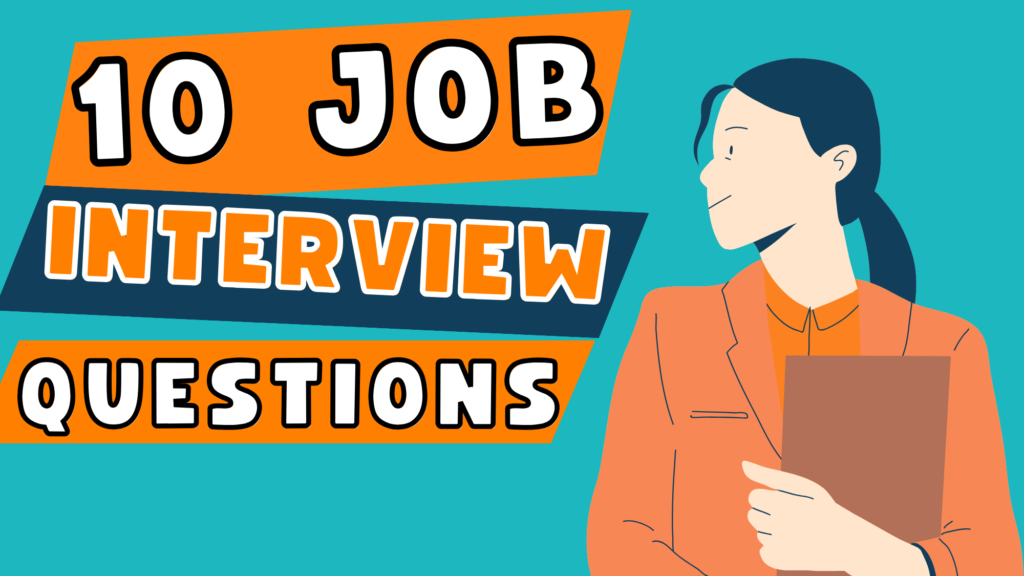Table of Contents
Job interviews can be nerve-wracking experiences for many people. Knowing what questions to expect and how to answer them can help ease anxiety and boost confidence.
Being well-prepared allows candidates to showcase their skills and make a strong impression on potential employers.
Understanding common interview questions and practising responses beforehand can significantly improve one’s chances of success in the hiring process.
This article will explore ten key questions that often come up during job interviews. By familiarising themselves with these queries, job seekers can develop thoughtful answers and present themselves in the best possible light to prospective employers.
1) “Tell me about yourself”
This common interview opener sets the stage for the entire conversation. It gives candidates a chance to make a strong first impression and highlight their key qualities.
When answering this question, it’s best to keep the response brief and focused. A good approach is to mention relevant work experience, skills, and career goals.
Candidates should aim to tailor their answer to the specific job they’re applying for. Highlighting achievements that align with the role can make a lasting impact on the interviewer.
It’s important to strike a balance between being professional and personable. Sharing a bit about one’s background can help create a connection with the interviewer.
Preparing for this question in advance can help candidates feel more confident. Practising the answer out loud can improve delivery and help identify areas for refinement.
Candidates should avoid rambling or sharing irrelevant personal information. The goal is to provide a concise overview that leaves the interviewer wanting to know more.
2) “What are your strengths and weaknesses?”
This question aims to assess a candidate’s self-awareness and honesty. Interviewers want to see how job seekers present their positive attributes and areas for improvement.
When discussing strengths, it’s important to highlight skills relevant to the job. Candidates should provide specific examples that demonstrate these strengths in action.
For weaknesses, it’s best to choose areas that aren’t critical to the role. Job seekers should also explain how they’re working to improve these weaknesses. This shows a commitment to personal growth.
It’s crucial to strike a balance between confidence and humility. Avoid sounding arrogant or too self-critical. Instead, present a realistic self-assessment.
Preparing answers in advance can help candidates feel more confident during the interview. It’s wise to practise delivering responses in a clear and concise manner.
By answering this question thoughtfully, job seekers can demonstrate their suitability for the role and show that they’re well-rounded individuals capable of growth.

3) “Why do you want to work here?”
This question allows employers to gauge a candidate’s interest and knowledge about their company. Job seekers should be prepared to give a thoughtful answer that demonstrates their research and enthusiasm.
A strong response typically includes specific reasons why the company appeals to the candidate. This might involve mentioning the organisation’s values, mission, or recent achievements.
Candidates should also explain how their skills and experience align with the role. They can highlight how they could contribute to the company’s goals and success.
It’s important to avoid generic answers like “it seems like a great place to work”. Instead, job seekers should provide specific examples that show they’ve done their homework.
Applicants might mention aspects of the company culture that resonate with them. They could also express excitement about potential growth opportunities within the organisation.
A well-crafted answer to this question can impress the interviewer and boost one’s chances of landing the job. It shows initiative, enthusiasm, and a genuine interest in the position.
4) “Describe a challenging work situation and how you handled it”
This question assesses a candidate’s problem-solving skills and ability to work under pressure. Interviewers want to know how applicants manage difficult situations in the workplace.
When answering, candidates should use the STAR method (Situation, Task, Action, Result) to structure their response. This approach helps provide a clear and concise answer.
It’s important to choose a relevant example that showcases one’s strengths and aligns with the job requirements. Candidates should focus on describing the challenge, their role in addressing it, and the positive outcome of their actions.
Interviewers are looking for evidence of critical thinking, leadership, and adaptability. Candidates should highlight these qualities in their response, demonstrating how they effectively managed the situation.
Preparing for this question in advance is crucial. Candidates should have a few examples ready to discuss, ensuring they can provide a thoughtful and well-structured answer during the interview.
5) “Where do you see yourself in five years?”
This question aims to gauge a candidate’s ambition and career goals. Hiring managers ask this to assess if the applicant’s aspirations align with the company’s needs.
Job seekers should prepare an answer that demonstrates commitment and growth potential. It’s wise to research the company’s structure and potential career paths before the interview.
A strong response might include plans for skill development or taking on increased responsibilities. Candidates should avoid mentioning plans that don’t relate to the role or company.
It’s important to strike a balance between ambition and realism. Overly lofty goals may seem unrealistic, while a lack of ambition could be off-putting.
Interviewees should tailor their answer to show how their future goals benefit the company. This approach demonstrates long-term interest in the organisation.
Flexibility is key, as career paths can change. Candidates might express openness to opportunities that may arise within the company.

6) “Why should we hire you?”
This question lets candidates show their value to the company. It’s a chance to stand out from other applicants.
A strong answer highlights how one’s skills and experience make them ideal for the role. Clarity and confidence are key when responding.
Candidates should focus on their unique qualities. They can mention examples from previous jobs that relate to the position’s key qualifications.
It’s important not to undermine any lack of experience. Instead, applicants should emphasise what makes them special.
The interviewer’s goal is often to check the candidate’s confidence level. A well-prepared answer can make a lasting impression.
Job seekers should research the company beforehand. This allows them to tailor their response to the organisation’s specific needs.
Applicants can discuss how their skills align with the job description. They might also mention how they can contribute to the company’s goals.
7) “Can you explain this gap in your employment history?”
This question often comes up when interviewers spot periods of unemployment on a CV. It’s important to be prepared with an honest and positive answer.
Many people experience gaps in their work history for various reasons. These might include caring for family, travelling, studying, or recovering from illness.
When answering, be honest and ready to explain your situation. Focus on any constructive activities you engaged in during this time.
For example, if you took time off to care for a relative, highlight the skills you developed, such as time management or problem-solving. If you were job hunting, mention any volunteer work or courses you completed.
It’s crucial to explain any spells of unemployment without appearing defensive. Emphasise how you’ve grown from the experience and how it’s made you a stronger candidate.
Employers understand that careers aren’t always linear. They’re often more interested in how you’ve used your time productively and what you’ve learned from the experience.
8) “How do you handle stress and pressure?”
Employers ask this question to gauge how candidates cope with workplace challenges. They want to know if potential hires can stay calm and productive when faced with demanding situations.
Strong answers focus on specific strategies for managing stress. Discussing problem-solving skills and resilience can demonstrate a candidate’s ability to handle pressure effectively.
Candidates might mention techniques like prioritising tasks, taking short breaks, or practising deep breathing. These methods show a proactive approach to stress management.
Giving concrete examples from past work experiences can be impactful. A candidate could describe a time when they successfully met a tight deadline or resolved a crisis at work.
It’s important to emphasise staying composed under pressure. Employers value team members who can remain level-headed during stressful periods.
Candidates should also highlight their ability to learn from challenging situations. Showing growth and adaptability in the face of stress can impress interviewers.
9) “What is your greatest professional achievement?”
This question aims to gauge a candidate’s accomplishments and self-awareness. It allows interviewers to assess how well applicants can articulate their successes.
When answering, candidates should choose a significant work-related achievement that showcases their skills and impact. It’s best to select an accomplishment that aligns with the job they’re applying for.
Applicants should describe the situation, their specific actions, and the positive results they achieved. Using numbers or percentages can help quantify the impact of their achievement.
It’s important to strike a balance between confidence and humility when discussing accomplishments. Candidates should focus on how their achievement benefited their team or organisation, not just themselves.
Professional achievements can include completing a challenging project, improving a process, or receiving recognition for outstanding performance. Other examples might be securing a major client, mentoring colleagues, or implementing a successful cost-saving measure.
Practising this answer beforehand can help candidates deliver it confidently during the interview. They should aim for a concise response that clearly demonstrates their value as a potential employee.

10) “Do you have any questions for us?”
This question often comes at the end of a job interview. It’s not just a polite wrap-up, but a chance for the candidate to show their interest and knowledge.
Interviewers ask this to gauge enthusiasm for the job and interest in the company. It’s important to be prepared with thoughtful questions.
Good questions might focus on the role, company culture, or future plans. For example, one could ask about day-to-day responsibilities or opportunities for growth.
Asking no questions can seem like a lack of interest. So, it’s wise to have a few ready, even if some get answered during the interview.
Thoughtful questions can help decide if the company and role are a good fit. They show the candidate has done research and is serious about the position.
It’s best to avoid questions about salary or benefits at this stage. Instead, focus on the role and how one can contribute to the company’s success.
Understanding Common Interview Question Categories
Job interviews often include different types of questions. Knowing these categories can help you prepare better answers. Let’s look at three main types of interview questions.
Technical Questions
Technical questions test your job-related knowledge and skills. They focus on your expertise in the field. For example, a software developer might be asked to explain a coding concept or solve a programming problem.
These questions can vary based on the job and industry. Some may be simple, while others might be more complex. It’s crucial to brush up on key skills for your role before the interview.
Practise answering technical questions out loud. This can help you explain complex ideas clearly. Also, don’t be afraid to ask for clarification if you’re unsure about a question.
Behavioural Questions
Behavioural questions look at how you’ve handled past situations. They help employers predict your future performance. These often start with phrases like “Tell me about a time when…”
When answering, use the STAR method. Be ready with specific examples from your work history. Choose stories that show your skills and how you’ve solved problems.
Situational Questions
Situational questions present hypothetical scenarios. They test how you might handle future challenges in the job. These often start with “What would you do if…”
To answer well, think through the problem step by step. Explain your thought process and the actions you’d take. Show how you’d use your skills and experience to solve the issue.
It’s okay to ask for more details if needed. This shows you’re thinking carefully about the situation. Try to align your answer with the company’s values and goals.
How to Structure Your Responses
Structuring your interview responses effectively can make a big difference. Two popular methods can help you give clear, concise answers that showcase your skills and experience.
The STAR Method
The STAR method stands for Situation, Task, Action, and Result. It’s a great way to answer behavioural interview questions.
Here’s how to use it:
- Situation: Describe the context of your example.
- Task: Explain what you needed to do.
- Action: Detail the steps you took.
- Result: Share the outcome of your actions.
This method helps you tell a complete story. It shows how you handled a challenge and what you achieved.
Keep your answer brief but detailed. Focus on relevant information that highlights your skills.
The CAR Technique
The CAR technique is similar to STAR. It stands for Context, Action, and Result. This method is slightly simpler but still effective for structuring responses.
Here’s how it works:
- Context: Set the scene and provide background.
- Action: Describe what you did to address the situation.
- Result: Share the outcome and any lessons learned.
This approach helps you stay focused. It ensures you cover the key points without rambling.
Practice using CAR for different scenarios. This will help you feel more confident in interviews.
Ready to Ace Your Next Job Interview?
Preparation is key to success in any job interview. By practicing these common questions and structuring your answers effectively, you can boost your confidence and leave a lasting impression on potential employers.
Looking for more career tips and job opportunities? Visit Jobshola to find the latest job listings, and resources to help you land your dream job!
Frequently Asked Questions
Job interviews can be nerve-wracking, but being prepared can boost your confidence. Here are some common questions job seekers often have about the interview process.
What should I wear to a job interview?
Choose clothing that is professional and appropriate for the company culture. For most offices, a suit or smart business attire is a safe choice. Make sure your clothes are clean, pressed, and fit well.
How long should my answers be?
Aim to keep your responses concise yet thorough, typically 1-2 minutes long. Provide enough detail to answer the question fully, but avoid rambling or going off-topic.
What is the best way to prepare for an interview?
Research the company thoroughly and practise answering common interview questions. Review the job description and prepare examples that demonstrate your relevant skills and experience.
Should I follow up after an interview?
Yes, it’s a good idea to send a thank-you email within 24 hours of the interview. Express your appreciation for the interviewer’s time and reiterate your interest in the position.
How do I answer if I don’t have experience in the field?
Focus on transferable skills and relevant experiences from other areas of your life. Emphasise your willingness to learn and your enthusiasm for the role.
What should I do if I get a question I don’t know the answer to?
Stay calm and be honest. It’s okay to say you’re not sure. Offer to find out or provide a related example. You can also ask for clarification if needed to better understand the question.



